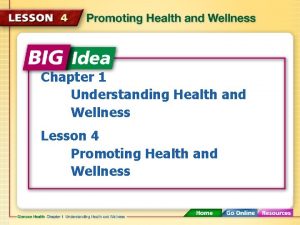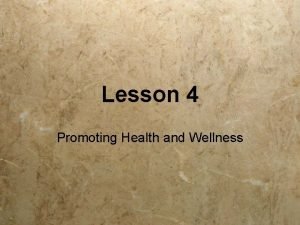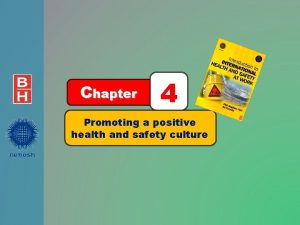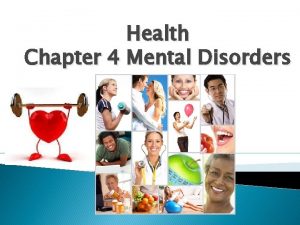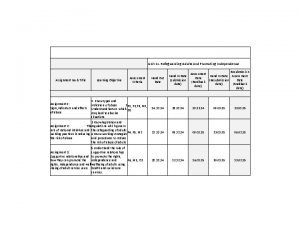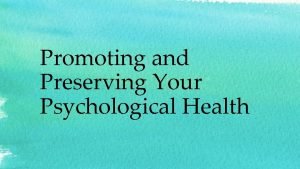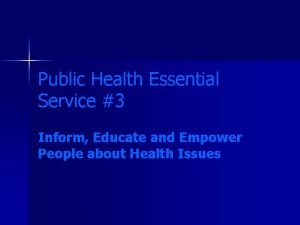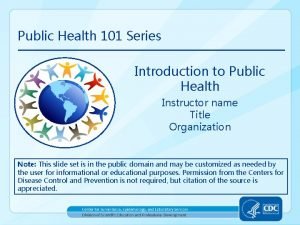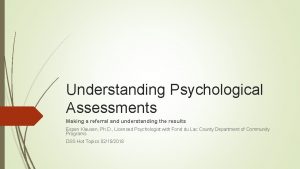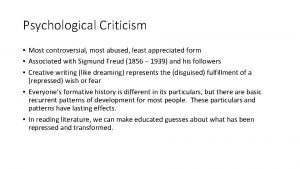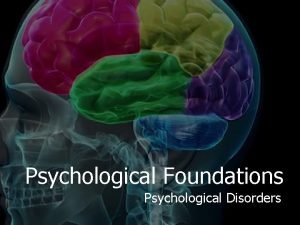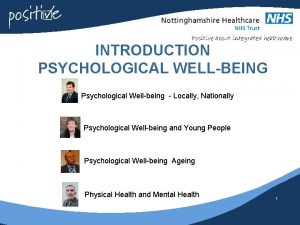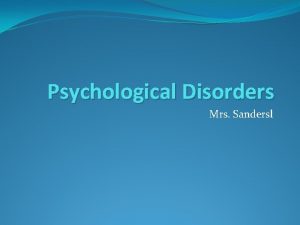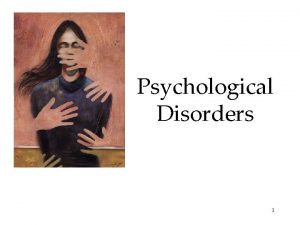Promoting and Preserving Your Psychological Health Essential Questions


































- Slides: 34

Promoting and Preserving Your Psychological Health

Essential Questions: • What are the Four Components of Psychological Health? • Can you identify basic traits shared by psychologically healthy people? • What are the Roles of self-efficacy and self-esteem, emotional intelligence, personality, maturity, and happiness in psychological well-being? • What are the most common psychological disorders? What are there causes and how can they be treated? • How can you help someone who is contemplating suicide? • What are the different types of treatment options and services available to those experiencing mental health problems?

What is Psychological Health? Spiritual Health (Being) Mental Health (Thinking) Emotional Health (Feeling) Social Health (Relating) • These four components are interrelated and dynamic. • Humans possess Resiliency to help cope with life’s challenges

Psychologically Healthy vs Unhealthy Task: Within your group, come up with definitions of both Good and Bad Psychological Health Think of the individuals that you feel are your closest friends. Which category would they fall into? Do you know of anyone who recently has shifted from one end of the Psychological spectrum to the other? Think of why that may have happened.

Characteristics of Psychologically Healthy and Unhealthy People

Maslow’s Hierarchy of Needs • Developed in 1960 s by Abraham Maslow • This theory states “A person’s needs must be met at each level before he/se can truly be happy. What are your thoughts about this?

Dimensions of Psychological Health Task: Your group will be assigned a dimension of Psychological Health (Emotional, Spiritual, Social or Mental). You need to Define your assigned dimension using words, symbols and/or pictures. After Defining your dimension, answer the questions relating to it (see assignment) You will present your information to the class!!!

Factors That Influence Psychological Health • Family • Social supports • Community • Self-efficacy and self-esteem • Personality –Personality traits related to psychological well-being include extroversion, openness to experience, emotional stability, conscientiousness, and resiliency. • Life span and maturity

The Mind–Body Connection • Psychoneuroimmunology (PNI) is the study of the brain and behavior and how they affect the body’s immune system. • Psychologist Martin Seligman developed the scientific study of human strengths, virtues. This is known as Positive Psychology. – Less focus on repairing mental health (Reactionary) – Focuses on things that make life worth living (Preventative) – Idea is to build on your strengths

Positive Psychological Actions • PERMA: five elements of well-being that help humans flourish: –Positive emotion –Engagement –Relationships –Meaning –Accomplishment

• What is Happiness? • Part of the study of positive psychology • Several positive states in which individuals embrace the world around them. • Characteristics of a happy person? • Do you think that unhappy people suffer from more health issues?

Strategies to Enhance Psychological Health • Develop a support group. • Complete required tasks. • Form realistic expectations. • Make time for yourself. • Maintain physical health. • Examine problems and seek needed help. • Get adequate sleep.

When Psychological Health Deteriorates • Stress, abusive relationships, anxiety, loneliness, financial upheavals, and other trauma can derail a person’s coping resources. • Mental illnesses are disorders that disrupt thinking, feeling, moods, and behaviors, and cause varying degrees of impaired functioning in daily living. • Mental health problems are common among college students, and they appear to be increasing in number and severity. • In 2015, 9 percent of undergraduate students surveyed considered suicide • 1 in 4 college students are diagnosed/treated with a mental health issue

Mental Illnesses Common in College Students

Mood Disorders • Chronic Mood Disorders • Affects how you feel • Usually Persistent • Include: Major Depression, Persistent Depressive Disorder (PDD), Bipolar Disorder, and Seasonal Affective Disorder (SAD)

Major Depression • Not the same as feeling down after a bad experience • Severe disorder that affects approximately 8% of the U. S. Population in a given year • Physical effects include sleep disturbance, exhaustion, and mental effects (inability to concentrate). • What are Symptoms of Major Depression that we should be aware of?

Other Types of Depression • Persistent depressive disorder (PDD) is a less severe type of depression that is milder, chronic, harder to recognize, and often characterized by fatigue, pessimism, or a short temper. • Bipolar disorder (also called manic depression). – Extreme highs (mania) Extreme lows (depression) – Swings can be rapid at times, but then slow and gradual • Seasonal affective disorder (SAD) is a type of depression that occurs in the winter months, when there is less sunlight. – People suffer from extreme fatigue, irritability, carb craving, weight gain, sadness – Treatment includes: light therapy, diet change, increased exercise, stress management techniques, medication

See It! Video: What Are the Causes for Depression

Causes of Mood Disorders Genetics Hormones Life Events Medications Early Childhood Trauma Changes in physical health (stroke, chronic pain, diabetes, etc)

Anxiety Disorders • Characterized by persistent feelings of threat and worry • Number one mental health problem in the United States, affecting more than 40 million adults each year. • Anxiety disorders include generalized anxiety disorder (GAD), panic disorders, obsessive – compulsive disorder (OCD), phobic disorders, and post-traumatic stress disorder (PTSD).

Generalized Anxiety Disorder (GAD) • Constant sense of worry that can cause restlessness, difficulty concentrating, tension • Severe enough to interfere with daily life • Diagnosis: One exhibits at least 3 of the following symptoms for more days than not during a Six month period – Restlessness or on edge – Easily fatigued – Difficulty concentrating or mind going blank – Irritability – Muscle Tension – Sleep Disturbances

Anxiety Disorders con’t Panic Disorder - Characterized by Panic attacks - Treatable, but can be destructive if happen often - Symptoms can include: increased respiration, chills, hot flashes, shortness of breath, stomach cramps, chest pain, sense of doom - Heredity, Stress and certain biochemical factors may be causes - Your chances of having one increases if a close relative has history

Anxiety Disorders (cont. ) • Phobic disorders, or phobias - persistent, irrational fear of a specific object, activity, or situation. – Heights, Insects, etc – Social Phobia (Social Anxiety Disorder) - avoidance of social situations • People with obsessive-compulsive disorder (OCD) feel compelled to perform rituals over and over again, are fearful of dirt or contamination, are abnormally attentive to (obsessed with) order, and have persistent intrusive thoughts.

Anxiety Disorders Cont’d Posttraumatic Stress Disorder (PTSD) • Delayed Response to a traumatic event • Traumatic Events actually cause chemical changes in the brain • 14% of Combat Veterans that fought in Iraq and Afghanistan experienced PTSD. • Do you think the highest rate of PTSD is war related? • Males or Females have the highest number of cases? • Symptoms: Detached from emotional state, flashbacks or nightmares, acute anxiety or nervousness, mood swings, insomnia, difficulty concentrating, intense reactions when memory of event

See It! Video: Battling Post Traumatic Stress Discussion Questions 1. Discuss the challenges soldiers have upon re-entry into the United States after serving abroad. Discuss the signs and symptoms associated with PTSD. 2. Why is it critical to address the mental health needs of soldiers? What are the societal implications of not treating those who suffer from PTSD? 3. If you were to develop a plan to provide support for veterans, what types of professionals would you include in your efforts? What services would you offer? .

Causes of Anxiety and Phobic Disorders • Biology • Origin of anxiety may be traced to the brain and how it functions • Families tend to display similar brain reactivity • Environment • Anxiety can be learned response • Social and cultural roles • Men vs Women – repression vs expression © 2018 Pearson Education, Inc.

What is a Personality Disorder? • “An enduring pattern of inner experience and behavior that deviates markedly from the expectation of the individual’s culture and is pervasive and inflexible. ” • Most common is Schizophrenia • Alterations of senses (auditory and visual hallucinations) • Symptoms: delusional behavior, hallucinations, incoherent and rambling speech, altered sense of self, inability to think logically, difficulty with normal daily functioning. • MRI scans helped scientists determine that it is a biological disease of the brain • Brain damage can occur early if life • Fetal exposure to toxic substances and hereditary links are possibly responsible

Personality Disorders • Paranoid personality disorder involves pervasive, unfounded suspicion and mistrust of other people. • Narcissistic personality disorder is an exaggerated sense of self-importance and a tendency to be absorbed with self rather than others. • Antisocial personality disorders display a long-term pattern of manipulation and taking advantage of others, often in a criminal manner. • Borderline personality disorder (BPD) is characterized by impulsiveness and risky behaviors such as gambling sprees, unsafe sex, use of illicit drugs, and other reckless acts, such as daredevil driving.

Suicide: Giving Up on Life • Anyone who expresses a desire to kill themselves or who has made an attempt to do so is at risk for suicide. • Common signs that a person is contemplating suicide include: –Recent loss; inability to let go of grief –History of depression –Change in personality/behavior –Expressions of self-hatred

Suicide: Giving Up on Life (cont. ) • Common signs continued… –Change in sleep patterns –Direct or indirect statements about committing suicide –Final preparations, such as writing a will, giving away possessions, or writing revealing letters –Preoccupation with death themes –Marked change in personal appearance

Activity Break • Get into groups of four or five. • Write a plan of action as if you suspected that your roommate was contemplating suicide. • List the steps you might take to intervene and get him or help.

Preventing Suicide • You can take the following specific actions to help prevent someone from committing suicide: –Monitor the warning signals. –Take threats seriously. –Let the person know how much you care about him or her. –Ask directly. –Do not belittle the person’s feelings. –Help come up with alternatives. –Tell someone; do not keep your suspicions to yourself.

Seeking Professional Help (cont. ) • Treatment models (cont. ) –Behavioral therapy focuses on what we do—our behavior patterns. • Pharmacological treatment –Drug therapy can be an important adjunct in the treatment of many psychological disorders, especially as new medications are continually developed.

Assessing Yourself—A Personal Inventory • Go online to Mastering. Health to take the “How Psychologically Healthy Are You? ” assessment • Are you ready to consider ways in which you might improve your psychosocial health? If so, what methods would you use? • If you have concerns about your mental health, are you ready to make an appointment with a counselor or therapist?
 Lesson 4 promoting health and wellness
Lesson 4 promoting health and wellness Lesson 4 promoting health and wellness
Lesson 4 promoting health and wellness Lesson 4 promoting health and wellness
Lesson 4 promoting health and wellness Chapter 7 promoting health and wellness
Chapter 7 promoting health and wellness Promoting a positive health and safety culture
Promoting a positive health and safety culture Health and wellness vocabulary
Health and wellness vocabulary Chapter 8 preserving your credit
Chapter 8 preserving your credit Preserving your credit
Preserving your credit Promoting infant health section 7-2
Promoting infant health section 7-2 Health promoting schools model
Health promoting schools model Health promoting school
Health promoting school Mental health essential questions
Mental health essential questions Essential questions about mental health
Essential questions about mental health Plamatic acid
Plamatic acid Ecology preserving the animal kingdom
Ecology preserving the animal kingdom Revealing information while preserving privacy
Revealing information while preserving privacy Orthogonal matrix properties
Orthogonal matrix properties Preserving statistical validity in adaptive data analysis
Preserving statistical validity in adaptive data analysis Style transfer
Style transfer Preserving food
Preserving food Purpose of food preservation
Purpose of food preservation Promote service arrange decide
Promote service arrange decide Chapter 13 distributing and promoting products
Chapter 13 distributing and promoting products Promoting services and educating customers
Promoting services and educating customers Unit 11 safeguarding adults and promoting independence
Unit 11 safeguarding adults and promoting independence Four components of psychological health
Four components of psychological health Core functions and essential services of public health
Core functions and essential services of public health Core functions and essential services of public health
Core functions and essential services of public health Examples of referral questions for psychological testing
Examples of referral questions for psychological testing Psychological criticism
Psychological criticism Enduring understanding examples
Enduring understanding examples Weathering and erosion questions
Weathering and erosion questions Capulet flag
Capulet flag The landlady text
The landlady text Promoting moral improvement
Promoting moral improvement

